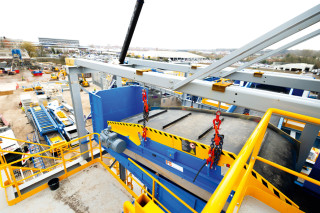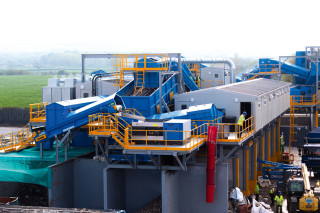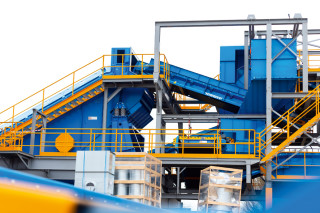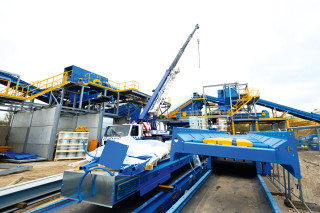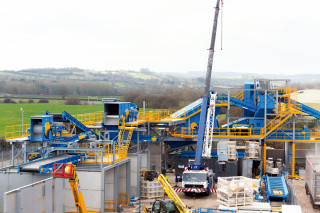Contractors operating in the south-west of England have no excuse to send waste from their sites to landfill now that a super-efficient £4m recycling plant has just been installed on the outskirts of Bristol.
ETM Recycling commissioned the plant from Meath-based specialist manufacturer Turmec to double the amount of waste it can handle and process at its Ashton Vale site. The new plant can handle 150,000 tonnes per year.
“Our previous plant would take 24 hours to process what this new plant can deal with in an hour – 80 tonnes,” says director Amy McCormack, who heads the recycling division of ETM, a family business.
The division is a preferred supplier for main contractors and housebuilders such as Skanska, Willmott Dixon, BAM and Galliford Try. The investment in the new plant was, in part, in response to their demand.
“The contractors that choose us are the ones that have environmental management systems at the forefront of their procurement so their sites have to be as close to ‘zero waste to landfill’ as possible,” explains McCormack. “This new plant is the only one in the south-west that can process construction and demolition waste to that degree.”
The plant extracts every last piece of recyclable material, right down to individual nails. It achieves this through a process employing 20 conveyor belts, six magnets – one of which weighs eight tonnes – and three quality control sheds where teams of up to 16 people sort through the residue.
It is supported by a fleet 19 skip lorries, five roll-on-roll-off (roro) units and an articulated lorry with a bulk tanker. This operates across the south-west and ‘over the bridge’ into south Wales.
At the time of writing, the plant was only operating at 60% of its capacity as it was being run in and snagged. But even though McCormack thinks it is unlikely to ever operate round the clock, the signs are that demand will increase.
“Landfills are closing in the area while waste is travelling further for residual disposal, and we want to avoid sending our waste to landfill at all costs,” she says. “Our old plant was at full capacity and was not efficiently processing and diverting enough waste from landfill.”
Before the new plant was up and operating ETM would only accept waste from its own fleet but now it also deals with national waste disposal contractors such as Biffa, Suez and Grundon and local operators.
“I make money on segregating the waste and then being able to get rid of it cheaply. We hire our own skips out at £200 and charge other operators £110 a tonne to tip here,” McCormack explains. “We sort out the mixed construction waste and then sell it on to our outlets.”
Clean hardcore is the main product and it goes straight to the company’s own quarry. “That’s brilliant for us,” she says, “because that is a closed loop.”
Wood is another major revenue-stream, with 600 tonnes a month being recovered. Grade A material is chipped and re-used as horse bedding while the rest – the majority in fact – is chipped for biomass fuel. UPVC window frames and doors are also picked out for recycling, while the five magnets pick out all the ferrous metal objects.
“We’ve got a whole skip full of nails and other small objects that were previously mixed,” comments McCormack.
The sixth and final machine is an eddy current separator that brings out the revenue-stream that the previous recycling plant missed: the non-ferrous metals. This uses eddy currents – an oscillating magnetic field – that induces a current in any good electrical conductor that, like aluminium or copper, is not ferromagnetic.
The whole operation started as a sideline to the main ETM business, launched in 1994 when Edward McCormack set up in business as a ‘man-and-JCB’ groundworks contractor. The core of the business was Bristol City Council’s highways and traffic management work but it has grown well beyond that.

Fujitsu, Siemens, Kingston Communications, Wessex Water, MEB, Telewest, Eurobell and Amey Highways number among its long-term private sector clients while Bristol City Council, North Somerset County Council, Bath & NE Somerset Council and South Gloucestershire County Council are among its local authority customers. The company now employs more than 200 staff.
The recycling business was a natural fit, as the company had a quarry at Durnford, near Long Ashton in Somerset, where it could take all the waste from the roadworks and from where it sourced its own aggregates.
After using just one skip lorry to collect the waste, Edward McCormack became one of the first in the UK to invest in a Rubble Master compact crusher, using it to boost production of clean, screened hardcore that could be sold either to Bristol City Council or to contractors building roads for house-builders.
“The whole motivation behind this was simply to increase production of hardcore but we outgrew that first machine in about two and a half years, when we then bought the Kiverco machine we’re replacing now,” says Amy McCormack. “We never thought of this becoming a business in its own right but it flourished as more major contractors came to us for their hardcore.”
This led to her joining the business from a management consultancy eight years ago, as recycling was showing greater potential than at first envisaged.
She says the prospects are even better now as the blue-chip clients ETM caters for are increasingly putting quality before price.
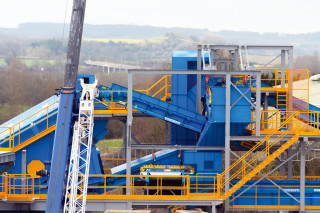
“These companies put environmental performance above price, so if another skip company came in and undercut me by a tenner it wouldn’t matter because their plant couldn’t divert all their waste from landfill,” she explains. “To achieve their targets they need companies with exceptional plant that process their waste with absolute duty of care and divert it from landfill.
“They can come here and audit us and be absolutely certain there are no issues concerning duty of care."
This article was first published in the May 2019 issue of The Construction Index magazine
UK readers can have their own copy of the magazine, in real paper, posted through their letterbox each month by taking out an annual subscription for just £50 a year. Click for details.
Got a story? Email news@theconstructionindex.co.uk


